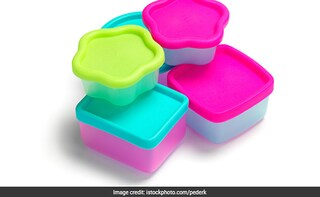A party at home will usually leave you with enough leftovers to last a few days. Chances are you will store them in a variety of plastic boxes and stack them in your fridge to be used over the next few meals. Why just your fridge, we take plastic lunch boxes to work, even give plastic water-bottles to our little ones to carry to school. Ever paid attention to the quality of these containers and bottles or how they are manufactured? Just have a look at the bottom of the box, somewhere there if you can see the numbers #3 or #7, then it might release chemicals like BPA (bisphenol A) or PVC (phthalates) which has an adverse effect to our body and hormone levels once in the blood stream.
According to Dr. Anju Sood, “It is not advisable to store hot or cooked food in a plastic container, but it is safe to store cool and dry food and it also depends upon the quality of the plastic used. There might be implications in place where temperature variation is common. And definitely it is not at all safe to take the substance (plastic container) and placing it in the microwave as it has genetic implications, can change the genetic make-up of the food, which could lead to some serious ailments in the future, even cancer. 2. Keep it away from hot water
Now, we don’t want you confused about how to use your plastic containers going forward. Don’t worry, there are ways in which you can continue to use your older plastic boxes without any of the side-effects. For example, you could wrap up the food in an aluminum foil sheet before storing it in the plastic container, so as to avoid the contact between chemicals and food. Use these containers to store dry snacks or open packets of chips and namkeens.
Plastic boxes and stack them in your fridge to be used over the next few meals.
According to Dr. Anju Sood, “It is not advisable to store hot or cooked food in a plastic container, but it is safe to store cool and dry food and it also depends upon the quality of the plastic used. There might be implications in place where temperature variation is common. And definitely it is not at all safe to take the substance (plastic container) and placing it in the microwave as it has genetic implications, can change the genetic make-up of the food, which could lead to some serious ailments in the future, even cancer. 2. Keep it away from hot water
Advertisement
Now, we don’t want you confused about how to use your plastic containers going forward. Don’t worry, there are ways in which you can continue to use your older plastic boxes without any of the side-effects. For example, you could wrap up the food in an aluminum foil sheet before storing it in the plastic container, so as to avoid the contact between chemicals and food. Use these containers to store dry snacks or open packets of chips and namkeens.
For the latest food news, health tips and recipes, like us on Facebook or follow us on Twitter and YouTube.
Advertisement
